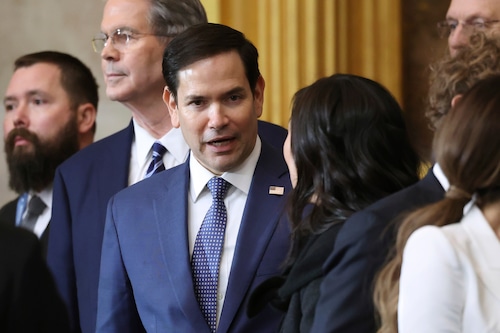Written by AP Diplomatic Writer Matthew Lee
Washington (AP) All U.S. foreign assistance programs will be temporarily suspended for 90 days as they are reviewed to see if they are in line with President Donald Trump’s policy objectives.
Since funding for many programs has already been allocated by Congress and is required to be spent, if not already spent, it was unclear at first how much aid would be impacted by the Monday order.
The order, one of several that Trump signed on his first day back in office, stated that the foreign aid bureaucracy and industry are not in line with American interests and are frequently incompatible with American values. It also serves to undermine international peace by fostering ideas abroad that are diametrically opposed to peaceful and stable relationships within and between nations.
Therefore, Trump announced that no further foreign aid from the United States would be given out in a way that did not entirely support the president’s foreign policy.
During his confirmation hearing this week, Secretary of State Marco Rubio informed the Senate Foreign Relations Committee that each dollar spent, program funded, and policy pursued must be supported by the answers to three straightforward questions:
Is America safer as a result? Is America stronger as a result? Does it increase the prosperity of America? “I said.”
Approved as secretary of state, Sen. Marco Rubio, R-Fla., attends the inauguration on January 20. (Photo by Pool/Kevin Lamarque via AP)AP
Trump’s signed order gives Rubio or his successor the authority to decide on such matters after consulting the Office of Management and Budget. The primary organizations in charge of managing international aid are the State Department and the U.S. Agency for International Development.
Even though foreign aid normally only makes up around 1% of the federal budget, unless there are exceptional situations, like the billions of dollars in weapons sent to Ukraine, Trump has long complained about it. The sum sent to Ukraine to strengthen its defenses against Russia’s invasion has drawn criticism from Trump.
Mid-December and the 2023 fiscal year mark the Biden administration’s final official accounting of foreign aid. It reveals that $68 billion has been committed to international programs in 204 nations and areas, ranging from health and pro-democracy campaigns to disaster relief.
Israel ($3.3 billion annually), Egypt ($1.5 billion annually), and Jordan ($1.7 billion annually), some of the largest recipients of U.S. aid, are unlikely to experience significant cuts because those sums are part of long-term packages that go back decades and are occasionally subject to treaty obligations.
Republican governments have historically slashed or otherwise reduced funding for U.N. agencies, such as those involved in peacekeeping, human rights, and refugees. In an effort to save foreign aid spending, the first Trump administration stopped supporting the Palestinian Authority and many UN agencies, including the U.N. Population Fund.
But under Trump, the United States had already withdrawn from the U.N. Human Rights Council and its financial commitments, and a bill signed by former President Joe Biden last March prohibited funding the U.N. organization for Palestinian refugees, or UNRWA.

